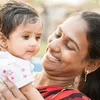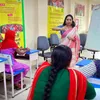Meet the women entrepreneurs working on gender justice since 1995
Co-founded in 1995 by Nandita Gandhi and Nandita Shah, Akshara Centre is a Mumbai-based non-profit, which empowers girls and women, and educates boys and men on how they can be allies.
In 1972, news of a young tribal girl who had been raped by two policemen surfaced and shook the country. The Supreme Court initially ruled that there was no evidence of rape, citing that the teenager was ‘habituated to sexual intercourse’ and that she may have enticed the policemen. Later, on appeal, the Nagpur Bench of the Bombay High Court sentenced the accused to one and five years of jail term, but in 1979 reversed the ruling and acquitted the men.
The behaviour of the judges and their final verdict on the case enraged women across the country, and protests began erupting. At the protests were two young women, Nandita Gandhi and Nandita Shah, who met and became friends.

Nandita Gandhi (L) and Nandita Shah (R)
In 1992, the two wrote a book together, titled The Issues at Stake: Theory and Practice in the Contemporary Women's Movement in India. This, they say, is what forged their partnership to initiate Akshara Centre.
"It is while writing the book, we felt a need for a resource center which takes the understanding of gender equality to people through different methods, and Akshara was born," they say.
The co-founders describe Akshara Centre as a non-profit organisation working for women's empowerment, and building a gender-just society and equal society for men, women, and others.
“Akshara Centre believes all women and girls in society should be equal and empowered. The two go hand in hand – the process of being empowered builds the determination to be equal and in struggling to be equal, you are empowering yourself,” say the founders.
Nandita Gandhi, 70, and Nandita Shah, 59, both hold a PhD in Social Science from the University of Amsterdam. Shah has represented India at many international platforms, and is part of the Civil Society Advisory Group of UN Women's multi-country office.
Akshara Centre has been running on donations from individuals and corporates, and is located in premises given to them by the BMC (Brihanmumbai Municipal Corporation). It also receives programmatic funding by donor agencies like UN Women and other foreign and Indian foundations.
Towards a gender-just society
Akshara Centre operates with three programmes aimed at empowering young women and sensitising young men about becoming allies.
- Empowering Dreams Programme, works with underprivileged young women, such as single mothers, women from scheduled castes, and Muslims, and financially supports them to pursue higher education. The programme also takes them through a 'Life Skills and Technical Skills' training so that they are equipped to be self-confident, aware of their rights, to resist violence and be job-ready. The co-founders claim that so far, over 5,000 girls have received scholarship support.
- Youth for Change Programme, which urges young men to be allies in the movement against violence. The youth who are enrolled are supported to become ‘gender champions’ who introspect and question their gender inequality, and then challenge gender norms and the way society treats women. The programme is spread across 20 colleges in Mumbai, and over the years the organisations claims to have enrolled 25,000 gender champions.
- Making public spaces safe by working with the police to establish an emergency helpline, training bus conductors to handle sexual harassment cases, and railway police to prevent harassers. The organisation claims to have reached out to 22,000 conductors and drivers so far, and have incorporated gender module in the refresher training curriculum of BEST (Brihanmumbai Electric Supply and Transport).

College students at a sensitisation programme
One of the most recent achievements of Akshara Centre has been to ensure that the new revised Mumbai Development Plan is gender-inclusive.
Elaborating on this achievement, the co-founders say,
"For the first time in the history of our country, a gender chapter has been included in the city plan document. This means huge land reservations for amenities and services for women including multipurpose housing, child care and senior citizen care centres, hawking space and increased public toilets."
Akshara Centre has also developed an online course on gender issues called Streenet, which is used to train activists, academicians, and college lecturers. It has also designed an interactive game series - Yuvak and Yuvati Mela - Games for Equality aimed at engaging young women and men on issues of gender. The Melas have been taken up in six states, by nine partner organisations. This has been translated into three languages and, according to the organisation, has reached thousands of young people across the country.

Women at a Mela organised by Akshara Foundation
Facing challenges
Introducing gender sensitisation programmes in the 90s, when Akshara Centre first began operations, was a relatively new concept. Even today, many are reluctant to speak about the issue and take action. On the challenges they face trying to make society a better place, the co-founders say,
"The biggest challenge is the scale of the problem. Everything we do creates ripples. But the challenge we are currently facing is to increase volunteerism; people are not coming forward on their own to take action. Whenever we take one step forward and make a change there is something new that comes up in different ways which reinforces the negative stereotype."
Success stories
In the 25 years that Akshara Centre has been working, their programmes have impacted thousands of young women and helped them lead better lives. The organisation provided HerStory with two testimonials.
Pallavi Sakharpekar, joined the organisation three years ago, after being referred by her sister. The daughter of a daily wage earner and homemaker, Pallavi was initially shy and was low on confidence. And although she was very good at studies, her father did not think it was important to educate women.
After joining the organisation, Pallavi applied for a scholarship, and is now pursuing a degree in Philosophy from Ramnarain Ruia College, Mumbai.
“Before joining Akshara, I was a very shy person and was under-confident and unable to control my emotions. I was afraid to speak to people or negotiate with my family members on the decisions that they took about my life. But as I started attending sessions and workshops, I observed drastic changes in myself, and it helped me build my communication skills and confidence," she says.
Chetna Rajan Kajrolkar was shy, and was unable to even speak to the staff members at Akshara Centre when she first visited their office. She was afraid to communicate in groups, and couldn't build or sustain relationships with friends and family. Her father, who is the sole-breadwinner of the family as a security guard, found it hard to fund her education, along with that of her siblings.
Chetna then received a scholarship from the organisation, and is now pursuing a Diploma in Architecture from Regional Vocational Training Institute (RVTI).
Now in the second year of her course, Chetna now is able to communicate with ease, and participates in all the activities at college and at the organisation.
The way forward
In the next five years, the co-founders feel more men will be engaged in the entire process of gender justice. They also strongly believe that laws will be better implemented, and hope that the media supports the cause through articles that create impact. They also want corporates to partner with them to build a better gender-equal world, and schools to take up the challenge of creating gender-equal conversations.
"We have spent our entire lives working to change the lives of women and we are constantly asked if we see change. Although gender equality is not here as yet, the biggest change is the shift in blame. The silence around violence has broken, and fingers are now pointed more in the direction of the accused rather than a survivor," they add.
Nandita Gandhi and Nandita Shah say they are hopeful and feel that if everyone works together, we can achieve the dream of a gender-equal society in our lifetime. They hope more people, especially the youth understands the importance of this goal, and actively works towards it.
(Edited by Rekha Balakrishnan)











